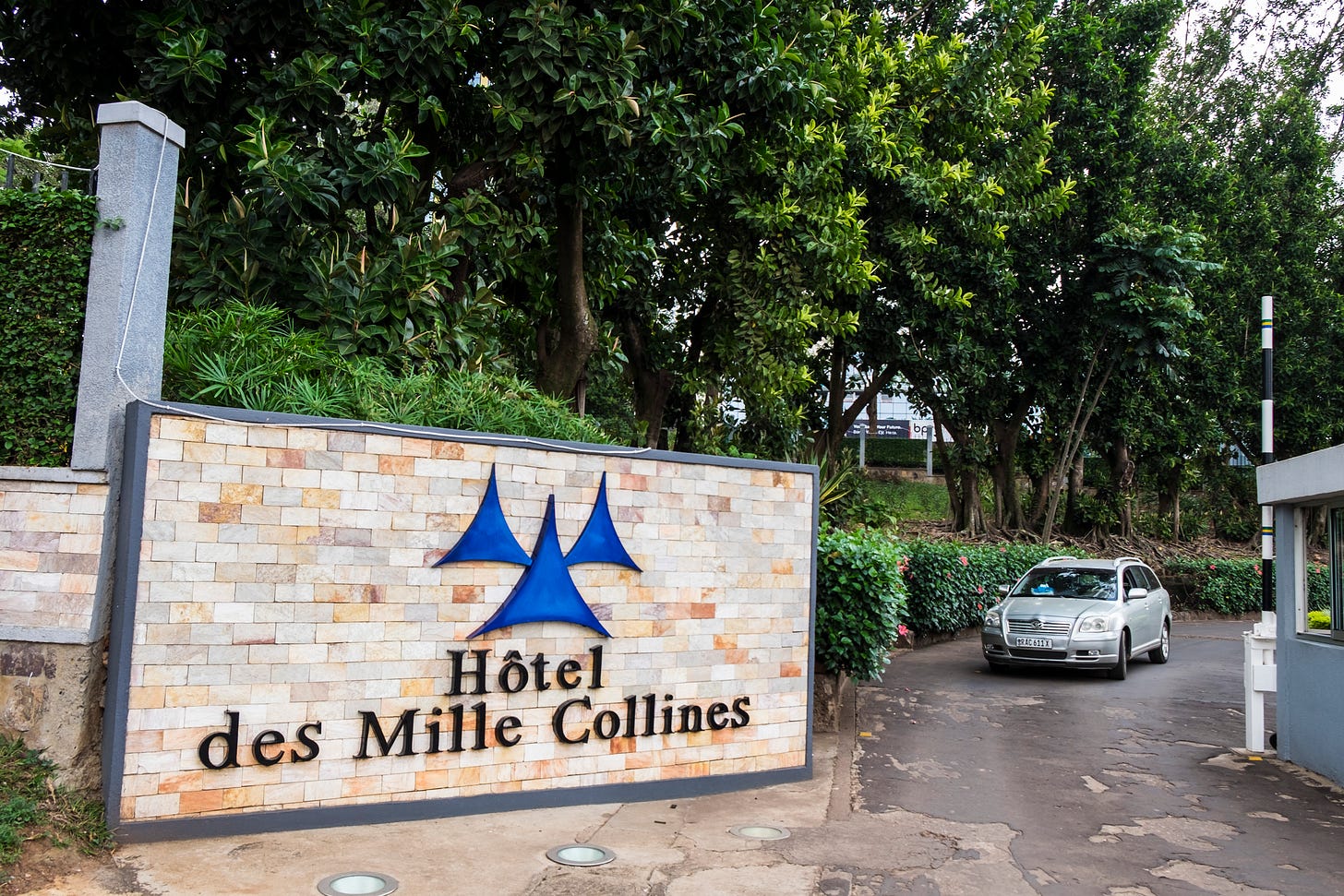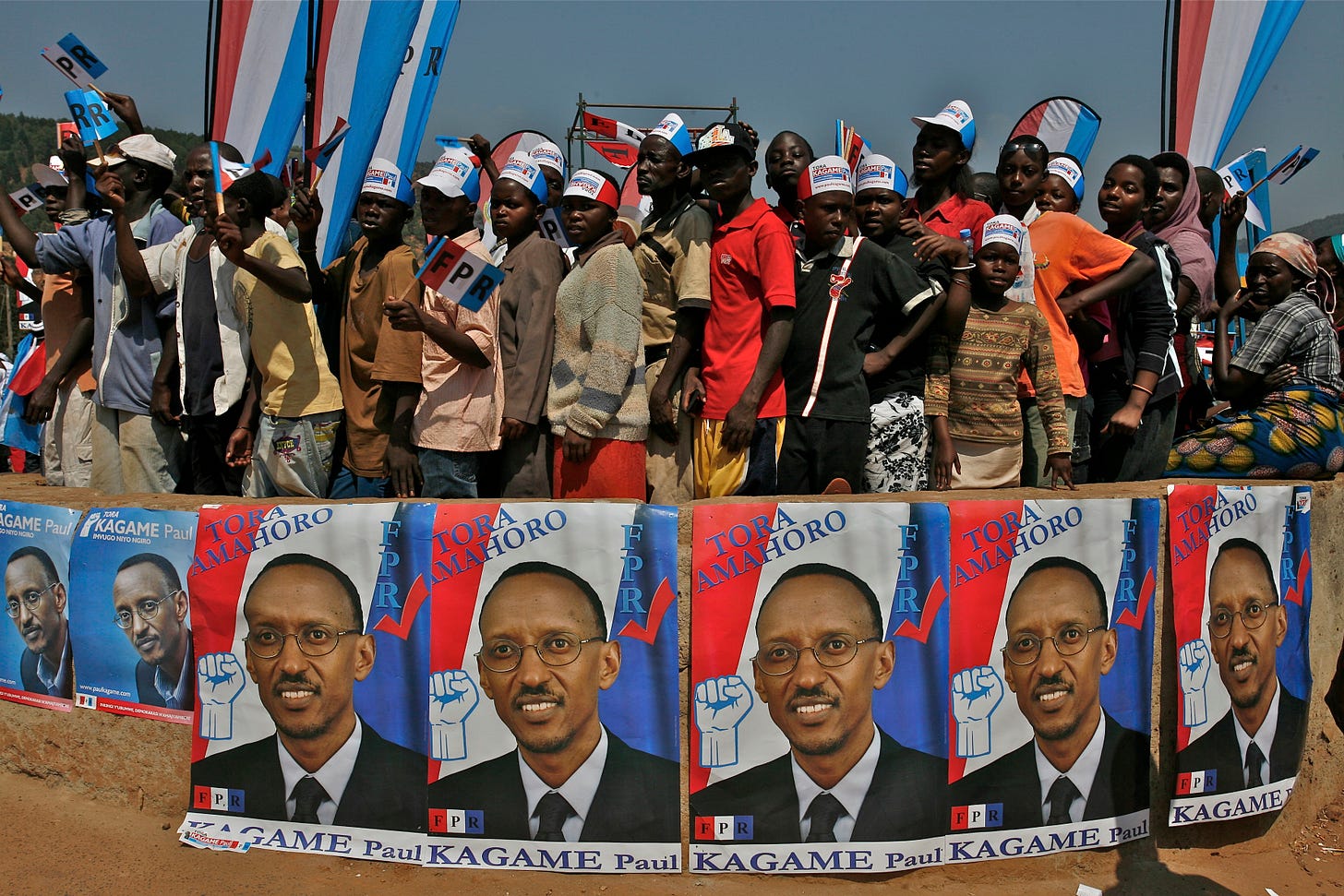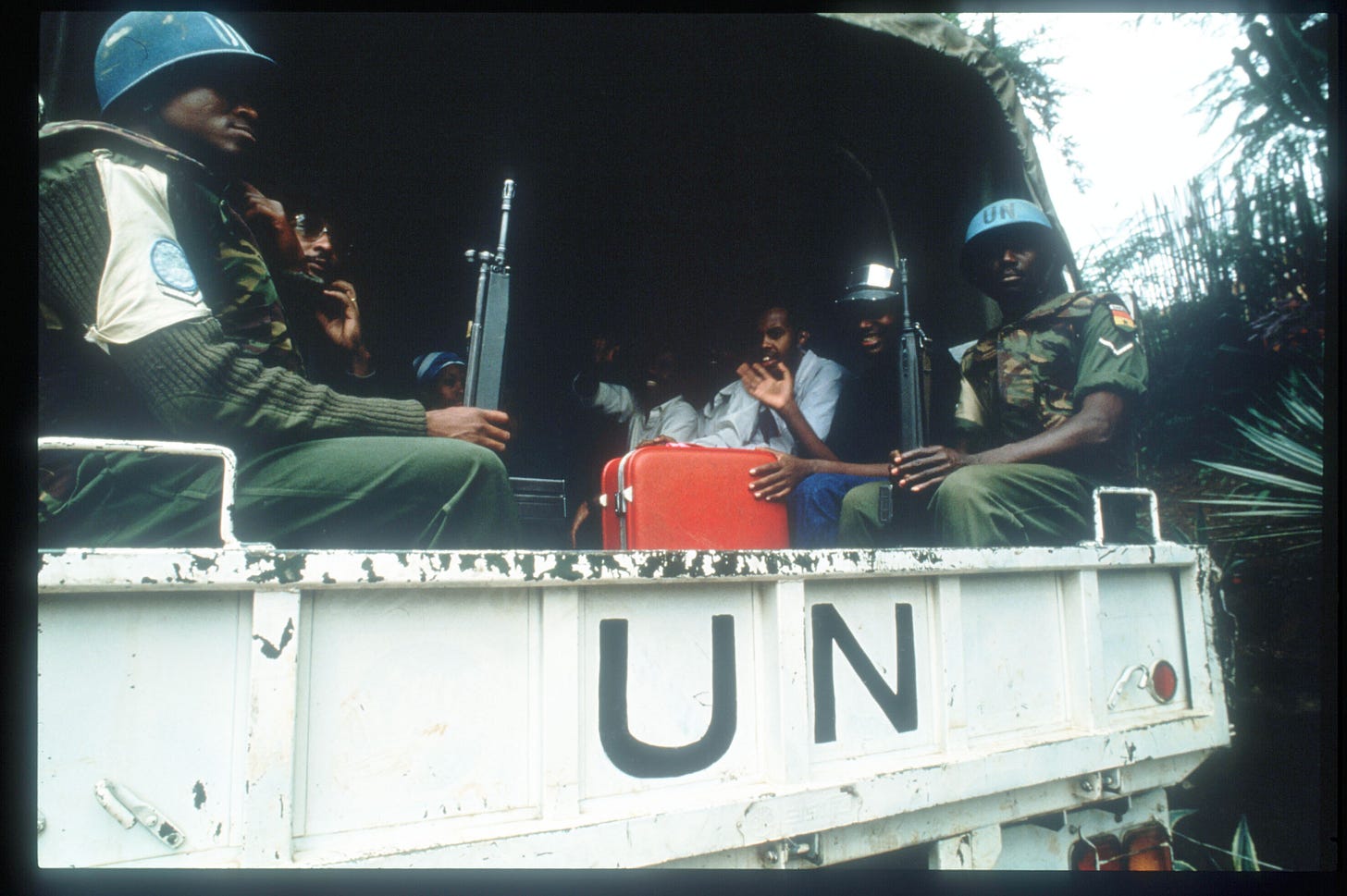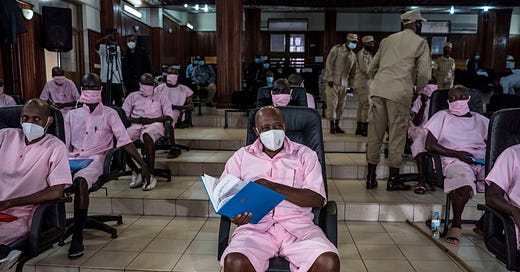The man who saved lives in the Hotel Rwanda has been convicted of terrorism (part 2 of 2)
Is he the peaceful savior of Rwanda, or a man who carries out violent acts against his own state?
Journalism is too opaque and misunderstood. Chills gives a behind-the-scenes look at how dangerous investigative journalism gets made.
I left off in the first installment of this two-part series asking whether Paul Rusesabagina, a man who saved the lives of more than 1,200 people during Rwanda’s 1994 genocide, is now a terrorist. He is serving 25 years in prison on terror charges brought by President Paul Kagame’s government.
Is Rusesabagina a peaceful savior — the hotel manager-turned-hero he has been portrayed as in popular culture, the man who bravely sheltered all those people in the Hotel des Milles Collines — or a man who carried out violent criminal acts against his own state?
Or is Rusesabagina simply another victim of the ongoing strain between Rwanda’s Hutu and Tutsi ethnic groups?
The answer is as complicated as the country itself, and as its history, including the 1990-1994 civil war and resultant genocide.
Despite the popular depiction of Rusesabagina as a benevolent hero in the 2004 movie “Hotel Rwanda” — Don Cheadle’s portrayal of Rusesabagina earned an Academy Award nomination, as did the film’s screenplay — many genocide survivors and UN officers who were in the country in 1994 have called the film a fairytale.
“Hollywood created a myth; it wasn’t real,” Étienne Nsanzimana, president of Ibuka, an organization that represents victims of the genocide, told France 24. “Rusesabagina saw the hotel in 1994 and decided to take it over to serve his own interests — then he sold his story.”
One of the UN peacekeepers who was staying at the hotel at the time said in a 2004 interview that Rusesabagina had given the Rwandan army the names and room numbers of the most vulnerable refugees — and he’s not the only direct witness who’s made this allegation. Fortunately, amid the insanity, the peacekeepers reportedly intervened and helped relocate those targets to other rooms within the hotel. Using the chaos to their advantage, people ripped room numbers off the doors to confound invaders.
While I was reporting for the first part of this series, I spoke to Rwandan survivors who made it clear that many of the people who waited out the 100-day genocide in the hotel do not consider Rusesabagina to be a savior. Many, in fact, were told by friends that the manager had forced them to pay for their shelter in that desperate time — even though the hotel’s owner, the Belgian national airline, Sabena, allegedly told him not to charge the refugees. One survivor wrote a book that calls Rusesabagina “a profiteering, politically ambitious Hutu Power sympathizer who extorted money from those who sought refuge, threatening to send those who did not pay to the genocidaires, despite pleas from the hotel’s corporate ownership to stop.”
Information about Rusesabagina’s misdeeds also comes from UN peacekeepers under the command of Major General Roméo Dallaire, the Canadian head of the UN peacekeeping mission for Rwanda (and writer of the portentous and horrifyingly ignored “genocide fax” sent to UN headquarters in New York). These men say they were ordered to maintain a presence at the entrance to the Mille Collines, and to report immediately any attempts by armed Hutus to enter the hotel, but that Rusesabagina, a Hutu, did everything in his power to have these peacekeepers removed.

When the movie “Hotel Rwanda” premiered in 2004, Dallaire called it “not worth looking at.” Captain Amadou Deme of the UN peacekeeping force wrote in his memoir: “I can testify that I personally was not able to watch that movie beyond a point as I found it so repulsive for its untruthfulness.”
Not everyone who was there harbors ill will toward Rusesabagina, however. Some Rwandans, like Abias Musonera, who spent six weeks hiding in room 216 in the Mille Collines, in which his wife, Imaculée, gave birth to a son they named Moses, are still grateful to Rusesabagina for shielding them from the violence outside the hotel.
“Nobody died here,” Musonera told The New York Times. “God protected us and Paul protected us and all of us helped each other.”
What disturbs many Rwandans even more than the highly burnished depiction of Rusesabagina in the film, however, is that since the genocide, he has denied that the extensively documented events happened as reported.
Rusesabagina said in 2007 that he does not believe that Hutu extremists were the leaders of the mass killing. Instead, he claimed that Kagame, a Tutsi who was then head of the Rwandan Patriotic Front — a rebel force that has been commonly credited with ending the genocide — had infiltrated the murderous Hutu militia (the Interahamwe) and these butchers were unknowingly working for him. In other words, according to Rusesabagina, the Tutsis were the ones killing Tutsis, not the Hutus.
Rwandan ethnic politics and the politics of the genocide are remarkably complex, but this claim still requires mental gymnastics. Read more about Rusesabagina’s twisting of facts in this interview.
In the years since the genocide, Rusesabagina has been an outspoken critic of Kagame and his government. Here, some of the claims are less far-fetched. In fact, Kagame has been ignoring or trampling the basic tenets of democracy and human rights ever since he was officially elected in 2000. Casualties include press freedom (even when journalists are not officially censored, they censor themselves out of fear of government reprisals); free and fair elections (Kagame is regularly reelected with 99 percent of the vote); and basic rule of law (Kagame has condoned the murders of his opponents, for instance).

At the same time, the president has been praised by world leaders as a visionary. “Kagame is known as a doer and an implementer, not somebody who says things just like everyone else,” Desire Assogbavi, previously of Oxfam, told Agence France-Presse in 2017.
In a good summary of what Kagame has done both for and to Rwanda, journalist Frank Smyth wrote for the Committee to Protect Journalists in 2014: “Modern Rwanda is in many ways a progressive nation looking to curb corruption, promote development and protect the environment. But it is by no means a democracy, and it is a nation without a free press.”
Last year, at Rusesabagina’s sentencing, Judge Beatrice Mukamurenzi enumerated the many crimes of which he had been convicted: “[Rusesabagina] founded a terrorist organization that attacked Rwanda. He financially contributed to terrorist activities. He approved monthly provisions of funds for these activities. He invented a code to hide these activities.”
Rusesabagina long ago fled Rwanda for Belgium, and later Texas. From exile, he became the leader of the Rwandan Movement for Democratic Change (MRCD). The MRCD is a coalition of opposition groups that include an armed wing, the National Liberation Forces or FLN, which has carried out violent attacks. Rusesabagina has made public statements indicating that he supports that use of force.
Perhaps most damningly, he declared in a 2018 video, “the time has come for us to use any means possible to bring about change in Rwanda, as all political means have been tried and failed.”
In court last year, wearing a pink prison uniform, he said: “We formed the FLN as an armed wing, not as a terrorist group as the prosecution keeps saying. I do not deny that the FLN committed crimes, but my role was diplomacy.”
Recently, Taciana Rusesabagina, Paul’s wife, wrote in a Washington Post op-ed: “Paul used his words, wit and intellect to save 1,268 Tutsis and Hutus at the Hotel des Mille Collines during one of the most horrific killing sprees in modern times.”
She went on: “Simply stated, Paul has been a voice for the voiceless, calling out loudly in favor of human rights and a system of democracy that does not currently exist.”
Case in point: The Rwandan government brought Rusesabagina to Rwanda under false pretenses and violated his right to due process in multiple ways, including by using spyware on his daughter’s devices, forcibly abducting him and intercepting privileged communications with his lawyers, according to Human Rights Watch.
“From the moment of his arrest to the delivery of the verdict, this trial has been riddled with irregularities and evidence of political interference,” an HRW report said.
“The Rwandan authorities have the right to prosecute genuine security offenses, but they have undermined their case every step of the way, starting with the manner in which they unlawfully detained Paul Rusesabagina, through multiple violations of the right to a fair trial,” said Lewis Mudge, HRW’s Central Africa director. The court rejected these allegations of ill-treatment.
Regardless of his guilt or innocence of violent terrorism, regardless of whether the government he is accused of attacking is legitimate or blatantly antidemocratic, and regardless of whether his reputation for heroism during the genocide is earned honestly or exaggerated or even undermined by his own concurrent actions, the fact is that Rusesabagina has been convicted. Adding insult to injury, the Rwandan government has appealed the 25-year sentence as not being harsh enough.
The most important takeaway from all of this is that a country that went through one of the worst genocides in history is still grappling with the very issues that caused it to happen in the first place.

Until the Rwandan leadership allows a truly democratic reckoning, including the participation of a free press, the people of Rwanda may never have enough information to answer the question of whether Rusesabagina is a terrorist or a victim of the state — much less agree on whether or not he is a hero or a villain in the history of Rwanda.
In the meantime, chilling words uttered by a grinning Kagame in 2013 continue to haunt this already haunted East African sliver of land: “Whoever is against our country will not escape our wrath,” the president said. “The person will face consequences.”
On Chills, there are no ads, and no outside influences because of it. This is a subscriber-supported space that gives a behind-the-scenes look at how risky investigative journalism gets made, from a journalist with 20 years of experience. Read Chills for free, or subscribe for bonus content like this. You can sign up here. Thank you for supporting independent journalism.





This is so complicated. Does Rwanda have its own version of Fox News with alternative facts? Curious about the trial too, how did they seat a jury for this?
Perhaps the truth is that Rusesabagina was an opportunistic fiendish terrorist who also saved lots of people. People are as complicated as this story.
oh, good grief. It is so hard to understand this. Very complex. Thank you for describing the situation relatively clearly.